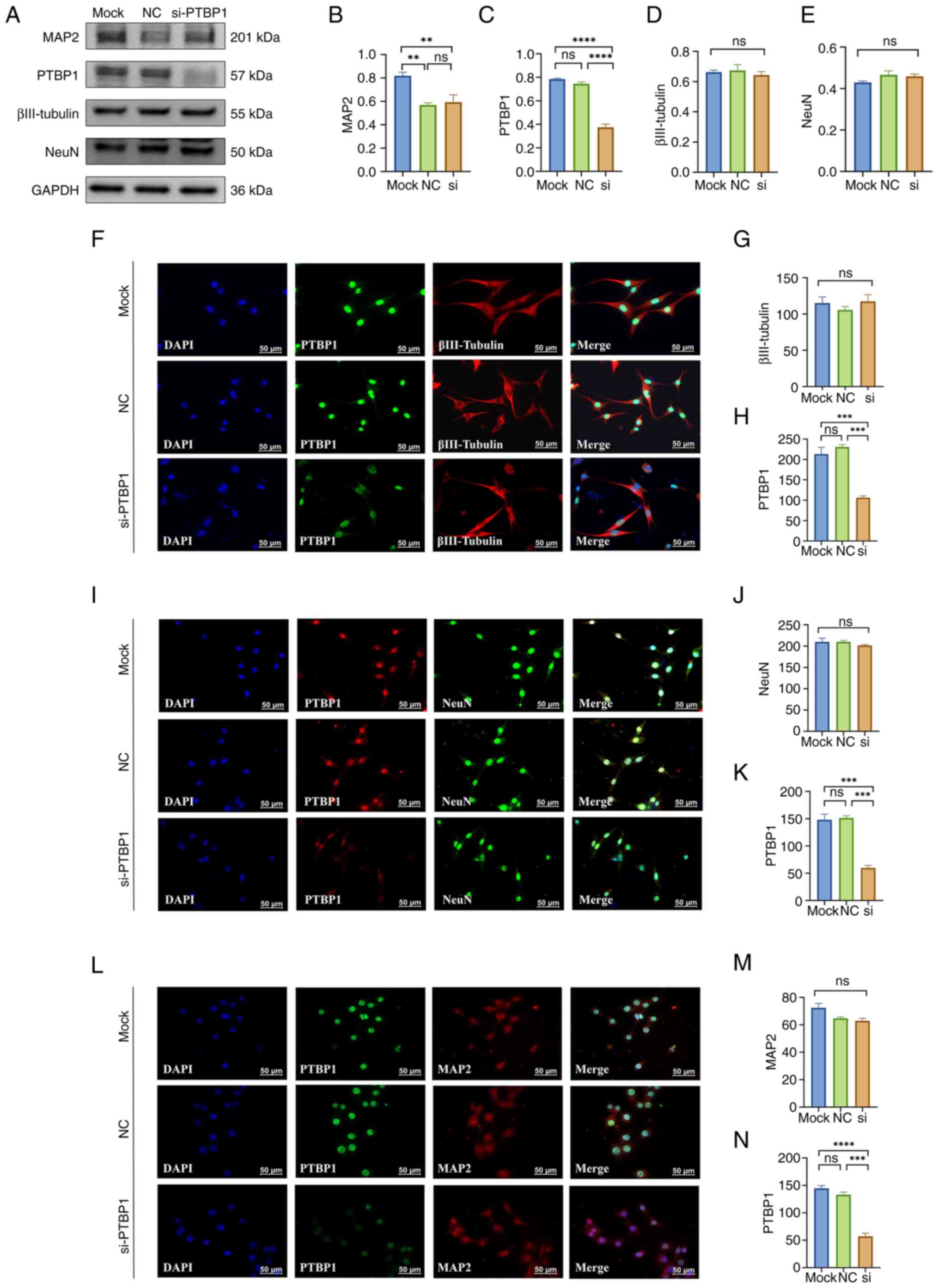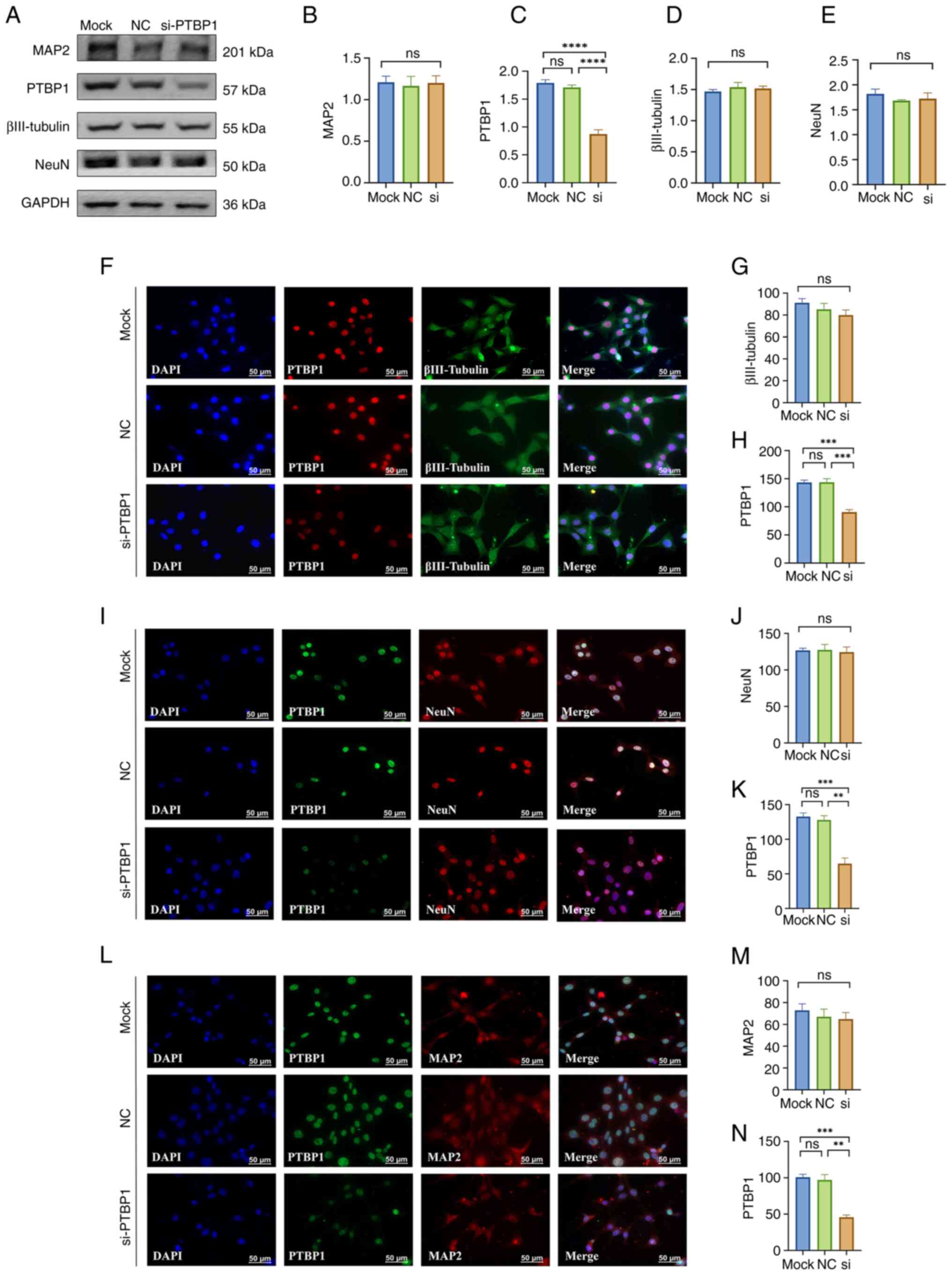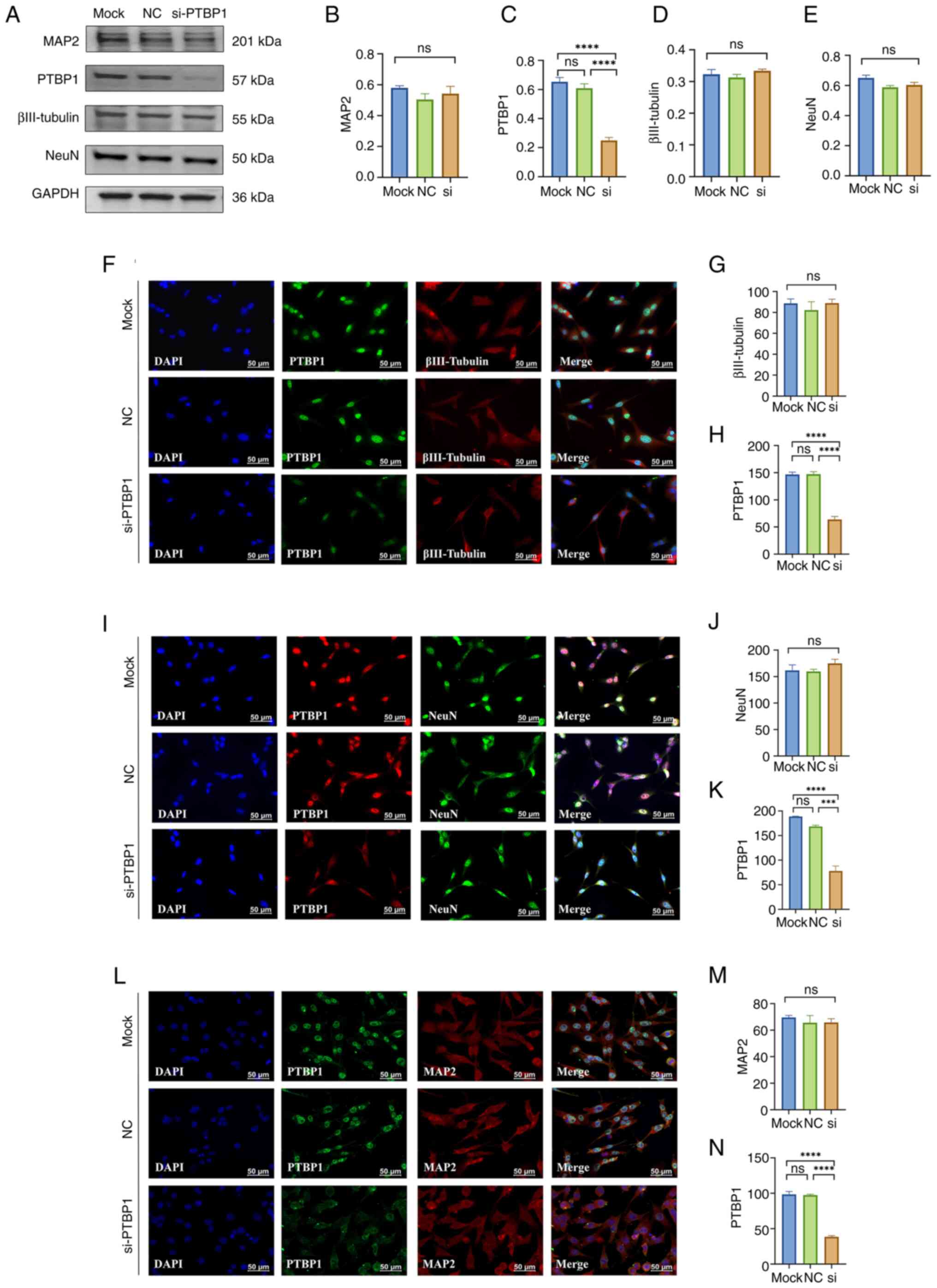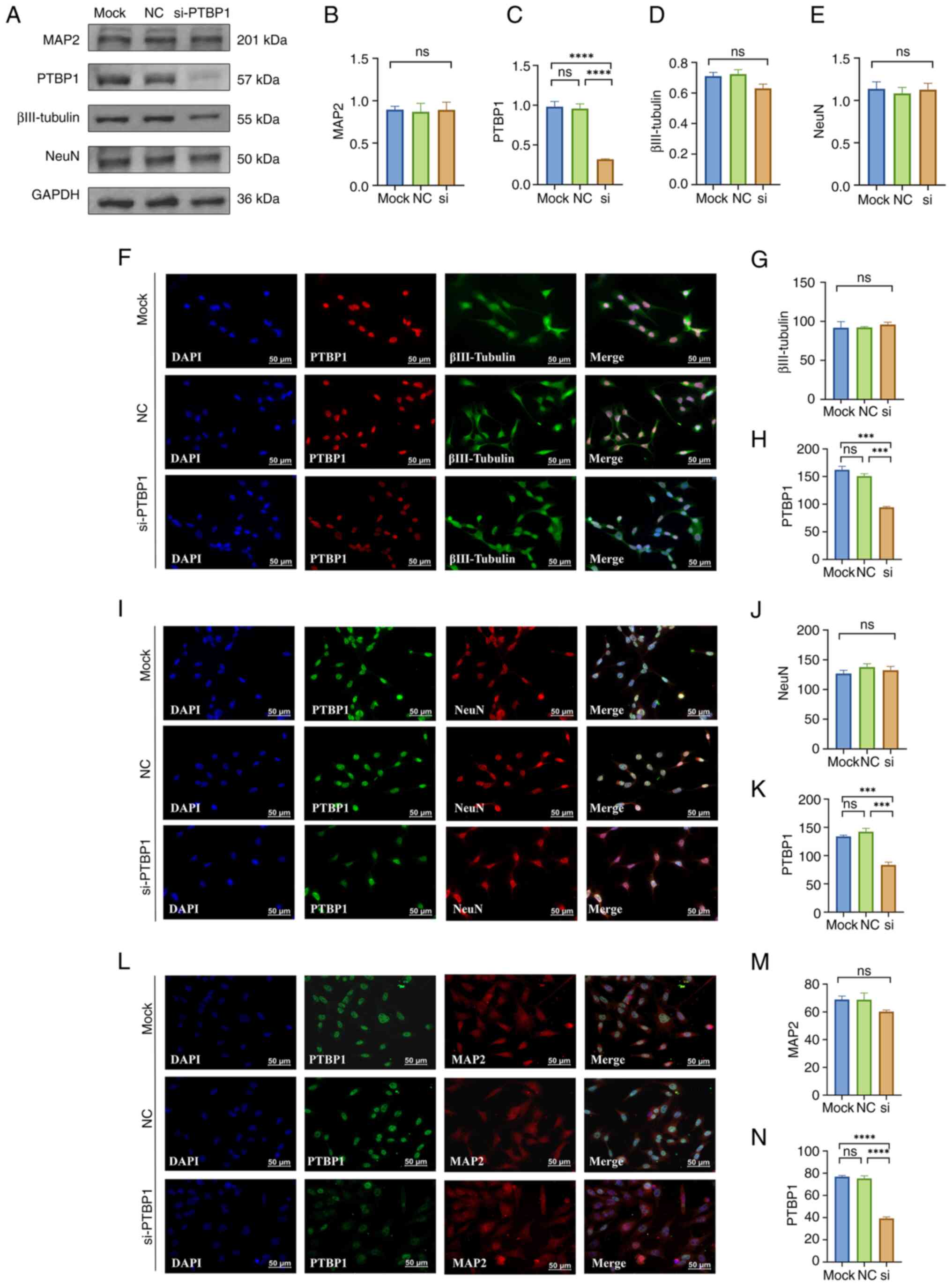|
1
|
Dugger BN and Dickson DW: Pathology of
neurodegenerative diseases. Cold Spring Harb Perspect Biol.
9(a028035)2017.PubMed/NCBI View Article : Google Scholar
|
|
2
|
Moujalled D, Strasser A and Liddell JR:
Molecular mechanisms of cell death in neurological diseases. Cell
Death Differ. 28:2029–2044. 2021.PubMed/NCBI View Article : Google Scholar
|
|
3
|
Nagata S: Apoptosis and clearance of
apoptotic cells. Annu Rev Immunol. 36:489–517. 2018.PubMed/NCBI View Article : Google Scholar
|
|
4
|
Felbor U, Kessler B, Mothes W, Goebel HH,
Ploegh HL, Bronson RT and Olsen BR: Neuronal loss and brain atrophy
in mice lacking cathepsins B and L. Proc Natl Acad Sci USA.
99:7883–7888. 2002.PubMed/NCBI View Article : Google Scholar
|
|
5
|
Koppelmans V, Silvester B and Duff K:
Neural mechanisms of motor dysfunction in mild cognitive impairment
and Alzheimer's disease: A systematic review. J Alzheimers Dis Rep.
6:307–344. 2022.PubMed/NCBI View Article : Google Scholar
|
|
6
|
Kumar D and Hassan MI: Neurodegenerative
brain models vs cell replacement or restoration therapy: A review
on promises and pitfalls. Biochem Biophys Res Commun. 585:124–131.
2021.PubMed/NCBI View Article : Google Scholar
|
|
7
|
Wang H, Yang Y, Liu J and Qian L: Direct
cell reprogramming: Approaches, mechanisms and progress. Nat Rev
Mol Cell Biol. 22:410–424. 2021.PubMed/NCBI View Article : Google Scholar
|
|
8
|
Peñalosa-Ruiz G, Bright AR, Mulder KW and
Veenstra GJC: The interplay of chromatin and transcription factors
during cell fate transitions in development and reprogramming.
Biochim Biophys Acta Gene Regul Mech. 1862(194407)2019.PubMed/NCBI View Article : Google Scholar
|
|
9
|
Comella-Bolla A, Orlandi JG, Miguez A,
Straccia M, García-Bravo M, Bombau G, Galofré M, Sanders P, Carrere
J, Segovia JC, et al: Human pluripotent stem cell-derived neurons
are functionally mature in vitro and integrate into the mouse
striatum following transplantation. Mol Neurobiol. 57:2766–2798.
2020.PubMed/NCBI View Article : Google Scholar
|
|
10
|
Wapinski OL, Vierbuchen T, Qu K, Lee QY,
Chanda S, Fuentes DR, Giresi PG, Ng YH, Marro S, Neff NF, et al:
Hierarchical mechanisms for direct reprogramming of fibroblasts to
neurons. Cell. 155:621–635. 2013.PubMed/NCBI View Article : Google Scholar
|
|
11
|
Wan J, Zhao XF, Vojtek A and Goldman D:
Retinal injury, growth factors, and cytokines converge on β-catenin
and pStat3 signaling to stimulate retina regeneration. Cell Rep.
9:285–297. 2014.PubMed/NCBI View Article : Google Scholar
|
|
12
|
Vierbuchen T, Ostermeier A, Pang ZP,
Kokubu Y, Südhof TC and Wernig M: Direct conversion of fibroblasts
to functional neurons by defined factors. Nature. 463:1035–1041.
2010.PubMed/NCBI View Article : Google Scholar
|
|
13
|
Zhang R, Zhang K, Li J, Liu Q and Xie J:
In vivo tracking of neuronal-like cells by magnetic resonance in
rabbit models of spinal cord injury. Neural Regen Res. 8:3373–3381.
2013.PubMed/NCBI View Article : Google Scholar
|
|
14
|
Weick JP: Functional properties of human
stem cell-derived neurons in health and disease. Stem Cells Int.
2016(4190438)2016.PubMed/NCBI View Article : Google Scholar
|
|
15
|
Maris C, Jayne S, Damberger FF, Beusch I,
Dorn G, Ravindranathan S and Allain FH: A transient α-helix in the
N-terminal RNA recognition motif of polypyrimidine tract binding
protein senses RNA secondary structure. Nucleic Acids Res.
48:4521–4537. 2020.PubMed/NCBI View Article : Google Scholar
|
|
16
|
Busch A and Hertel KJ: Evolution of SR
protein and hnRNP splicing regulatory factors. Wiley Interdiscip
Rev RNA. 3:1–12. 2012.PubMed/NCBI View
Article : Google Scholar
|
|
17
|
Fu XD and Mobley WC: Therapeutic potential
of PTB inhibition through converting glial cells to neurons in the
brain. Annu Rev Neurosci. 46:145–165. 2023.PubMed/NCBI View Article : Google Scholar
|
|
18
|
Liu HL, Lu XM, Wang HY, Hu KB, Wu QY, Liao
P, Li S, Long ZY and Wang YT: The role of RNA splicing factor PTBP1
in neuronal development. Biochim Biophys Acta Mol Cell Res.
1870(119506)2023.PubMed/NCBI View Article : Google Scholar
|
|
19
|
Zhao Y, Jiang H, Liu XW, Xiang LB, Zhou DP
and Chen JT: MiR-124 promotes bone marrow mesenchymal stem cells
differentiation into neurogenic cells for accelerating recovery in
the spinal cord injury. Tissue Cell. 47:140–146. 2015.PubMed/NCBI View Article : Google Scholar
|
|
20
|
Takahashi H, Nishimura J, Kagawa Y, Kano
Y, Takahashi Y, Wu X, Hiraki M, Hamabe A, Konno M, Haraguchi N, et
al: Significance of polypyrimidine tract-binding protein 1
expression in colorectal cancer. Mol Cancer Ther. 14:1705–1716.
2015.PubMed/NCBI View Article : Google Scholar
|
|
21
|
Xue Y, Ouyang K, Huang J, Zhou Y, Ouyang
H, Li H, Wang G, Wu Q, Wei C, Bi Y, et al: Direct conversion of
fibroblasts to neurons by reprogramming PTB-regulated microRNA
circuits. Cell. 152:82–96. 2013.PubMed/NCBI View Article : Google Scholar
|
|
22
|
Monzón-Casanova E, Screen M, Díaz-Muñoz
MD, Coulson RMR, Bell SE, Lamers G, Solimena M, Smith CWJ and
Turner M: The RNA-binding protein PTBP1 is necessary for B cell
selection in germinal centers. Nat Immunol. 19:267–278.
2018.PubMed/NCBI View Article : Google Scholar
|
|
23
|
Li Q, Zheng S, Han A, Lin CH, Stoilov P,
Fu XD and Black DL: The splicing regulator PTBP2 controls a program
of embryonic splicing required for neuronal maturation. Elife.
3(e01201)2014.PubMed/NCBI View Article : Google Scholar
|
|
24
|
Boutz PL, Stoilov P, Li Q, Lin CH, Chawla
G, Ostrow K, Shiue L, Ares M Jr and Black DL: A
post-transcriptional regulatory switch in polypyrimidine
tract-binding proteins reprograms alternative splicing in
developing neurons. Genes Dev. 21:1636–1652. 2007.PubMed/NCBI View Article : Google Scholar
|
|
25
|
Pina JM, Hernandez LA and Keppetipola NM:
Polypyrimidine tract binding proteins PTBP1 and PTBP2 interact with
distinct proteins under splicing conditions. PLoS One.
17(e0263287)2022.PubMed/NCBI View Article : Google Scholar
|
|
26
|
Contardo M, De Gioia R, Gagliardi D, Comi
GP, Ottoboni L, Nizzardo M and Corti S: Targeting PTB for
glia-to-neuron reprogramming in vitro and in vivo for therapeutic
development in neurological diseases. Biomedicines.
10(399)2022.PubMed/NCBI View Article : Google Scholar
|
|
27
|
Qian H, Kang X, Hu J, Zhang D, Liang Z,
Meng F, Zhang X, Xue Y, Maimon R, Dowdy SF, et al: Reversing a
model of Parkinson's disease with in situ converted nigral neurons.
Nature. 582:550–556. 2020.PubMed/NCBI View Article : Google Scholar
|
|
28
|
Fu X, Zhu J, Duan Y, Li G, Cai H, Zheng L,
Qian H, Zhang C, Jin Z, Fu X and Zhang K: Visual function
restoration in genetically blind mice via endogenous cellular
reprogramming. bioRxiv: 2020.2004.2008.030981, 2020.
|
|
29
|
Wang K, Pan S, Zhao P, Liu L, Chen Z, Bao
H, Wang H, Zhang Y, Zhuge Q and Yang J: PTBP1 knockdown promotes
neural differentiation of glioblastoma cells through UNC5B
receptor. Theranostics. 12:3847–3861. 2022.PubMed/NCBI View Article : Google Scholar
|
|
30
|
Xue Y, Qian H, Hu J, Zhou B, Zhou Y, Hu X,
Karakhanyan A, Pang Z and Fu XD: Sequential regulatory loops as key
gatekeepers for neuronal reprogramming in human cells. Nat
Neurosci. 19:807–815. 2016.PubMed/NCBI View Article : Google Scholar
|
|
31
|
Weinberg MS, Criswell HE, Powell SK, Bhatt
AP and McCown TJ: Viral vector reprogramming of adult resident
striatal oligodendrocytes into functional neurons. Mol Ther.
25:928–934. 2017.PubMed/NCBI View Article : Google Scholar
|
|
32
|
Wang LL, Serrano C, Zhong X, Ma S, Zou Y
and Zhang CL: Revisiting astrocyte to neuron conversion with
lineage tracing in vivo. Cell. 184:5465–5481.e16. 2021.PubMed/NCBI View Article : Google Scholar
|
|
33
|
Hoang T, Kim DW, Appel H, Pannullo NA,
Leavey P, Ozawa M, Zheng S, Yu M, Peachey NS and Blackshaw S:
Genetic loss of function of Ptbp1 does not induce glia-to-neuron
conversion in retina. Cell Rep. 39(110849)2022.PubMed/NCBI View Article : Google Scholar
|
|
34
|
Chen W, Zheng Q, Huang Q, Ma S and Li M:
Repressing PTBP1 fails to convert reactive astrocytes to
dopaminergic neurons in a 6-hydroxydopamine mouse model of
Parkinson's disease. Elife. 11(e75636)2022.PubMed/NCBI View Article : Google Scholar
|
|
35
|
Whittemore SR and Onifer SM: Immortalized
neural cell lines for CNS transplantation. Prog Brain Res.
127:49–65. 2000.PubMed/NCBI View Article : Google Scholar
|
|
36
|
Liu Z and Cheung HH: Stem cell-based
therapies for parkinson disease. Int J Mol Sci.
21(8060)2020.PubMed/NCBI View Article : Google Scholar
|
|
37
|
Duncan T and Valenzuela M: Alzheimer's
disease, dementia, and stem cell therapy. Stem Cell Res Ther.
8(111)2017.PubMed/NCBI View Article : Google Scholar
|
|
38
|
Assinck P, Duncan GJ, Hilton BJ, Plemel JR
and Tetzlaff W: Cell transplantation therapy for spinal cord
injury. Nat Neurosci. 20:637–647. 2017.PubMed/NCBI View Article : Google Scholar
|
|
39
|
Martínez-Serrano A and Björklund A:
Immortalized neural progenitor cells for CNS gene transfer and
repair. Trends Neurosci. 20:530–538. 1997.PubMed/NCBI View Article : Google Scholar
|
|
40
|
Wang C, Cai X, Hu W, Li Z, Kong F, Chen X
and Wang D: Investigation of the neuroprotective effects of crocin
via antioxidant activities in HT22 cells and in mice with
Alzheimer's disease. Int J Mol Med. 43:956–966. 2019.PubMed/NCBI View Article : Google Scholar
|
|
41
|
Sofroniew MV and Vinters HV: Astrocytes:
Biology and pathology. Acta Neuropathol. 119:7–35. 2010.PubMed/NCBI View Article : Google Scholar
|
|
42
|
Luo L: Actin cytoskeleton regulation in
neuronal morphogenesis and structural plasticity. Annu Rev Cell Dev
Biol. 18:601–635. 2002.PubMed/NCBI View Article : Google Scholar
|
|
43
|
Gao L, Guan W, Wang M, Wang H, Yu J, Liu
Q, Qiu B, Yu Y, Ping Y, Bian X, et al: Direct generation of human
neuronal cells from adult astrocytes by small molecules. Stem Cell
Reports. 8:538–547. 2017.PubMed/NCBI View Article : Google Scholar
|
|
44
|
Hu W, Qiu B, Guan W, Wang Q, Wang M, Li W,
Gao L, Shen L, Huang Y, Xie G, et al: Direct conversion of normal
and Alzheimer's disease human fibroblasts into neuronal cells by
small molecules. Cell Stem Cell. 17:204–212. 2015.PubMed/NCBI View Article : Google Scholar
|
|
45
|
Janowska J, Gargas J, Ziemka-Nalecz M,
Zalewska T, Buzanska L and Sypecka J: Directed glial
differentiation and transdifferentiation for neural tissue
regeneration. Exp Neurol. 319(112813)2019.PubMed/NCBI View Article : Google Scholar
|
|
46
|
Chen XD, Liu HL, Li S, Hu KB, Wu QY, Liao
P, Wang HY, Long ZY, Lu XM and Wang YT: The latest role of
nerve-specific splicing factor PTBP1 in the transdifferentiation of
glial cells into neurons. Wiley Interdiscip Rev RNA.
14(e1740)2023.PubMed/NCBI View Article : Google Scholar
|
|
47
|
Wang F, Cheng L and Zhang X: Reprogramming
glial cells into functional neurons for neuro-regeneration:
Challenges and promise. Neurosci Bull. 37:1625–1636.
2021.PubMed/NCBI View Article : Google Scholar
|
|
48
|
Bocchi R, Masserdotti G and Götz M: Direct
neuronal reprogramming: Fast forward from new concepts toward
therapeutic approaches. Neuron. 110:366–393. 2022.PubMed/NCBI View Article : Google Scholar
|
|
49
|
Wan Y and Ding Y: Strategies and
mechanisms of neuronal reprogramming. Brain Res Bull.
199(110661)2023.PubMed/NCBI View Article : Google Scholar
|
|
50
|
Wei ZD and Shetty AK: Treating Parkinson's
disease by astrocyte reprogramming: Progress and challenges. Sci
Adv. 7(eabg3198)2021.PubMed/NCBI View Article : Google Scholar
|
|
51
|
Zhou H, Su J, Hu X, Zhou C, Li H, Chen Z,
Xiao Q, Wang B, Wu W, Sun Y, et al: Glia-to-neuron conversion by
CRISPR-CasRx alleviates symptoms of neurological disease in mice.
Cell. 181:590–603.e16. 2020.PubMed/NCBI View Article : Google Scholar
|
|
52
|
Srivastava D and DeWitt N: In vivo
cellular reprogramming: The next generation. Cell. 166:1386–1396.
2016.PubMed/NCBI View Article : Google Scholar
|
|
53
|
Cui J and Placzek WJ: PTBP1 modulation of
MCL1 expression regulates cellular apoptosis induced by antitubulin
chemotherapeutics. Cell Death Differ. 23:1681–1690. 2016.PubMed/NCBI View Article : Google Scholar
|
|
54
|
Cheung HC, Hai T, Zhu W, Baggerly KA,
Tsavachidis S, Krahe R and Cote GJ: Splicing factors PTBP1 and
PTBP2 promote proliferation and migration of glioma cell lines.
Brain. 132:2277–2288. 2009.PubMed/NCBI View Article : Google Scholar
|
|
55
|
Llorian M, Schwartz S, Clark TA, Hollander
D, Tan LY, Spellman R, Gordon A, Schweitzer AC, de la Grange P, Ast
G and Smith CW: Position-dependent alternative splicing activity
revealed by global profiling of alternative splicing events
regulated by PTB. Nat Struct Mol Biol. 17:1114–1123.
2010.PubMed/NCBI View Article : Google Scholar
|
|
56
|
Zhu W, Zhou BL, Rong LJ, Ye L, Xu HJ, Zhou
Y, Yan XJ, Liu WD, Zhu B, Wang L, et al: Roles of PTBP1 in
alternative splicing, glycolysis, and oncogensis. J Zhejiang Univ
Sci B. 21:122–136. 2020.PubMed/NCBI View Article : Google Scholar
|
|
57
|
Chen YC, Ma NX, Pei ZF, Wu Z, Do-Monte FH,
Keefe S, Yellin E, Chen MS, Yin JC, Lee G, et al: A NeuroD1
AAV-based gene therapy for functional brain repair after ischemic
injury through in vivo astrocyte-to-neuron conversion. Mol Ther.
28:217–234. 2020.PubMed/NCBI View Article : Google Scholar
|
|
58
|
Xie Y, Zhou J and Chen B: Critical
examination of Ptbp1-mediated glia-to-neuron conversion in the
mouse retina. Cell Rep. 39(110960)2022.PubMed/NCBI View Article : Google Scholar
|
|
59
|
Maimon R, Chillon-Marinas C, Snethlage CE,
Singhal SM, McAlonis-Downes M, Ling K, Rigo F, Bennett CF, Da Cruz
S, Hnasko TS, et al: Therapeutically viable generation of neurons
with antisense oligonucleotide suppression of PTB. Nat Neurosci.
24:1089–1099. 2021.PubMed/NCBI View Article : Google Scholar
|
|
60
|
Zhang L, Yin JC, Yeh H, Ma NX, Lee G, Chen
XA, Wang Y, Lin L, Chen L, Jin P, et al: Small molecules
efficiently reprogram human astroglial cells into functional
neurons. Cell Stem Cell. 17:735–747. 2015.PubMed/NCBI View Article : Google Scholar
|
|
61
|
Yeom KH, Mitchell S, Linares AJ, Zheng S,
Lin CH, Wang XJ, Hoffmann A and Black DL: Polypyrimidine
tract-binding protein blocks miRNA-124 biogenesis to enforce its
neuronal-specific expression in the mouse. Proc Natl Acad Sci USA.
115:E11061–e11070. 2018.PubMed/NCBI View Article : Google Scholar
|
|
62
|
Brulet R, Matsuda T, Zhang L, Miranda C,
Giacca M, Kaspar BK, Nakashima K and Hsieh J: NEUROD1 instructs
neuronal conversion in non-reactive astrocytes. Stem Cell Reports.
8:1506–1515. 2017.PubMed/NCBI View Article : Google Scholar
|
|
63
|
Hoang T, Kim DW, Appel H, Ozawa M, Zheng
S, Kim J and Blackshaw S: Ptbp1 deletion does not induce
astrocyte-to-neuron conversion. Nature. 618:E1–E7. 2023.PubMed/NCBI View Article : Google Scholar
|
|
64
|
Kishino T: Imprinting in neurons.
Cytogenet Genome Res. 113:209–214. 2006.PubMed/NCBI View Article : Google Scholar
|
|
65
|
Maqsood MI, Matin MM, Bahrami AR and
Ghasroldasht MM: Immortality of cell lines: Challenges and
advantages of establishment. Cell Biol Int. 37:1038–1045.
2013.PubMed/NCBI View Article : Google Scholar
|
|
66
|
Lim J, Bang Y, Kim KM and Choi HJ:
Differentiated HT22 cells as a novel model for in vitro screening
of serotonin reuptake inhibitors. Front Pharmacol.
13(1062650)2023.PubMed/NCBI View Article : Google Scholar
|
|
67
|
Li Q, Ma Z, Qin S and Zhao WJ: Virtual
screening-based drug development for the treatment of nervous
system diseases. Curr Neuropharmacol. 21:2447–2464. 2023.PubMed/NCBI View Article : Google Scholar
|


















